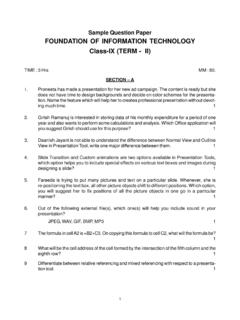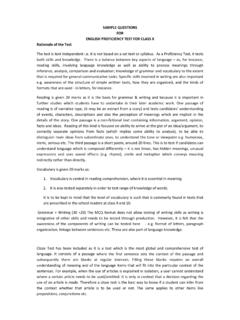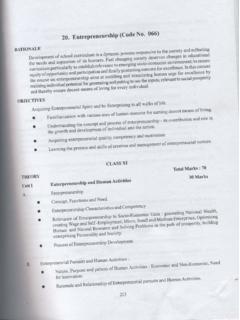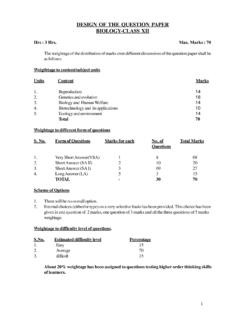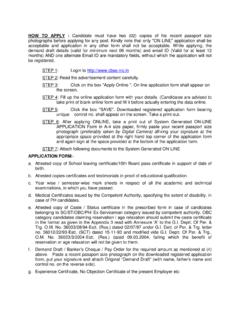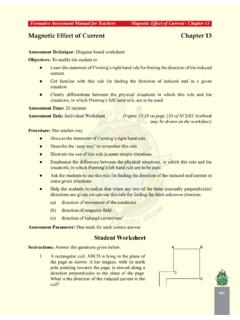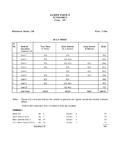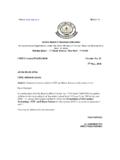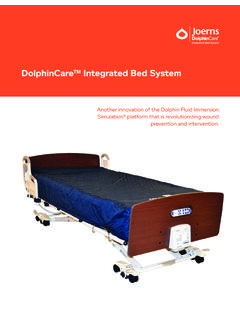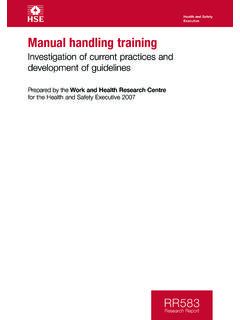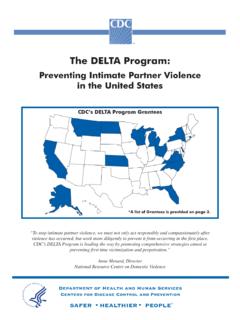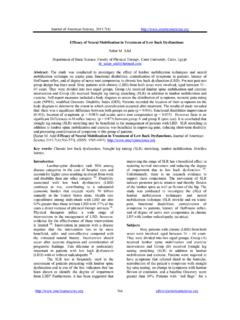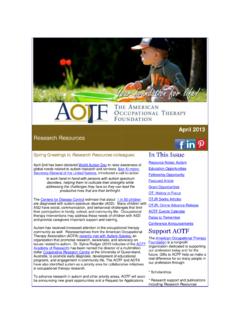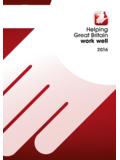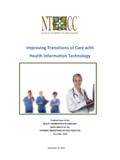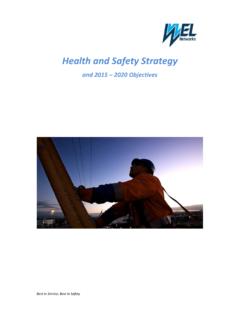Transcription of LIFESKILLS EDUCATION - Central Board of …
1 LIFESKILLS EDUCATION . Adolescence, a vital stage of growth and development, marks the period of transition from childhood to adulthood. It is characterized by rapid physiological changes and psychosocial maturation. Adolescence is also the stage when young people extend their relationships beyond parents and family and are intensely influenced by their peers and the outside world in general. As adolescents mature cognitively, their mental process becomes more analytical. They are now capable of abstract thinking, better articulation and of developing an independent ideology. These are truly the years of creativity, idealism, buoyancy and a spirit of adventure. But these are also the years of experimentation and risk-taking, of giving in to negative peer pressure, of taking uninformed decisions on crucial issues, especially relating to their bodies and their sexuality. Adolescence is thus a turning point in one's life , a period of increased potential but also one of greater vulnerability.
2 KEY ISSUES & CONCERNS OF ADOLESCENT. STUDENTS. Developing an Identity # Self awareness helps adolescents understand themselves and establish their personal identity. Lack of information and skills prevent them from effectively exploring their potential and establishing a positive image and sound career perspective. Managing Emotions # Adolescents have frequent mood changes reflecting feelings of anger, sadness, happiness, fear, shame, guilt, and love. Very often, they are unable to understand the emotional turmoil. # They do not have a supportive environment in order to share their concerns with others. Counseling facilities are not available. 1. Building Relationships # As a part of growing up, adolescents redefine their relationships with parents, peers and members of the opposite sex. Adults have high expectations from them and do not understand their feelings. # Adolescents need social skills for building positive and healthy relationships with others including peer of opposite sex.
3 They need to understand the importance of mutual respect and socially defined boundaries of every relationship. Resisting Peer Pressure # Adolescents find it difficult to resist peer pressure. Some of them may yield to these pressures and engage in experimentation. # Aggressive self conduct; irresponsible behaviour and substance abuse involve greater risks with regard to physical and mental health. # The experiment with smoking and milder drugs can lead to switching over to hard drugs and addiction at a later stage. Acquiring Information, EDUCATION and Services on issues of Adolescence # Exposure to media and mixed messages from the fast changing world have left adolescents with many unanswered questions # The widening gap in communication between adolescents and parents is a matter of great concern. # Teachers still feel inhibited to discuss issues frankly and sensitively. # Adolescents seek information from their peer group who are also ill informed and some may fall prey to quacks.
4 # Fear and hesitation prevents them from seeking knowledge on preventive methods and medical help if suffering from RTIs and STIs. Communicating and Negotiating safer life situations # Sexually active adolescents face greater health risks. # Girls may also face mental and emotional problems related to early sexual initiation. 2. # Resisting the vulnerability to drug abuse, violence and conflict with law or society. Understanding life skills A Teacher's prospective life skills have been defined as the abilities for adaptive and positive behaviour that enable individuals to deal effectively with the demands and challenges of everyday life . (WHO). Adaptive' means that a person is flexible in approach and is able to adjust in different circumstances. Positive behaviour' implies that a person is forward looking and even in difficult situations, can find a ray of hope and opportunities to find solutions. The terms Livelihood skills ' or occupational/vocational skills refer to capabilities, resources and opportunities to pursue individual and household economic goals and relate to income generation.
5 Thus, life skills are distinct from livelihood skills . Key life skills life skills include psychosocial competencies and interpersonal skills that help people make informed decisions, solve problems, think critically and creatively, communicate effectively, build healthy relationships, empathize with others, and cope with managing their lives in a healthy and productive manner. Essentially, there are two kinds of skills - those related to thinking termed as "thinking skills "; and skills related to dealing with others termed as "social skills ". While thinking skills relate to reflection at a personal level, social skills include interpersonal skills and do not necessarily depend on logical thinking. It is the combination of these two types of skills that are needed for achieving assertive behaviour and negotiating effectively. Emotional can be perceived as a skill not only in making rational decisions but also in being able to make others agree to one's point of view. To do that, coming to terms first with oneself is important.
6 Thus, self- management is an important skill including managing/coping with feelings, emotions, stress and resisting peer and family pressure. Young people as advocates need both thinking and social skills for consensus building and advocacy on issues of concern. 3. The Ten core life skills as laid down by WHO are: 1. Self-awareness 2. Empathy 3. Critical thinking 4. Creative thinking 5. Decision making 6. Problem Solving 7. Effective communication 8. Interpersonal relationship 9. Coping with stress 10. Coping with emotion Self-awareness includes recognition of self', our character, our strengths and weaknesses, desires and dislikes. Developing self-awareness can help us to recognize when we are stressed or feel under pressure. It is often a prerequisite to effective communication and interpersonal relations, as well as for developing empathy with others. Empathy - To have a successful relationship with our loved ones and society at large, we need to understand and care about other peoples' needs, desires and feelings.
7 Empathy is the ability to imagine what life is like for another person. Without empathy, our communication with others will amount to one-way traffic. Worst, we will be acting and behaving according to our self-interest and are bound to run into problems. No man is an island, no woman either! We grow up in relationships with many people parents, brothers and sisters, cousins, uncles and aunts, classmates, friends and neighbours. When we understand ourselves as well as others, we are better prepared to communicate our needs and desires. We will be more equipped to say what we want people to know, present our thoughts and ideas and tackle delicate issues without offending other people. At the same time, we will be able to elicit support from others, and win their understanding. Empathy can help us to accept others, who may be very different from ourselves. This can improve social interactions, especially, in situations of ethnic or cultural diversity. 4. Empathy can also help to encourage nurturing behaviour towards people in need of care and assistance, or tolerance, as is the case with AIDS sufferers, or people with mental disorders, who may be stigmatized and ostracized by the very people they depend upon for support.
8 Critical thinking is an ability to analyze information and experiences in an objective manner. Critical thinking can contribute to health by helping us to recognize and assess the factors that influence attitudes and behaviour, such as values, peer pressure and the media. Creative thinking is a novel way of seeing or doing things that is characteristic of four components fluency (generating new ideas), flexibility (shifting perspective easily), originality (conceiving of something new), and elaboration (building on other ideas). Decision making helps us to deal constructively with decisions about our lives. This can have consequences for health. It can teach people how to actively make decisions about their actions in relation to healthy assessment of different options and, what effects these different decisions are likely to have. Problem solving helps us to deal constructively with problems in our lives. Significant problems that are left unresolved can cause mental stress and give rise to accompanying physical strain.
9 Interpersonal relationship skills help us to relate in positive ways with the people we interact with. This may mean being able to make and keep friendly relationships, which can be of great importance to our mental and social well-being. It may mean keeping, good relations with family members, which are an important source of social support. It may also mean being able to end relationships constructively. 5. Effective communication means that we are able to express ourselves, both verbally and non-verbally, in ways that are appropriate to our cultures and situations. This means being able to express opinions and desires, and also needs and fears. And it may mean being able to ask for advice and help in a time of need. Coping with stress means recognizing the sources of stress in our lives, recognizing how this affects us, and acting in ways that help us control our levels of stress, by changing our environment or lifestyle and learning how to relax. Coping with emotions means involving recognizing emotions within us and others, being aware of how emotions influence behaviour and being able to respond to emotions appropriately.
10 Intense emotions like anger or sadness can have negative effects on our health if we do not respond appropriately. 6. Important FAQs: (a) How are life skills important for growing minds? We find that behaviour does not always follow the mind. This is when incidents of I know but I can't help it occur. What we need is the ability to act responsibly. life skills enable us to translate knowledge, attitudes and values into actual abilities. (b) Why is there a need for life skills EDUCATION ? The host of factors that promote high risk behaviour such as alcoholism, drug abuse and casual relationships are boredom, rebellion, disorientation, peer pressure and curiosity. The psychological push factors such as the inability to tackle emotional pain, conflicts, frustrations and anxieties about the future are often the driving force for high risk behaviour. life skills training is an efficacious tool for empowering the youth to act responsibly, take initiative and take control. It is based on the assumption that when young people are able to rise above emotional impasses arising from daily conflicts, entangled relationships and peer pressure, they are less likely to resort to anti social or high risk behaviours.
